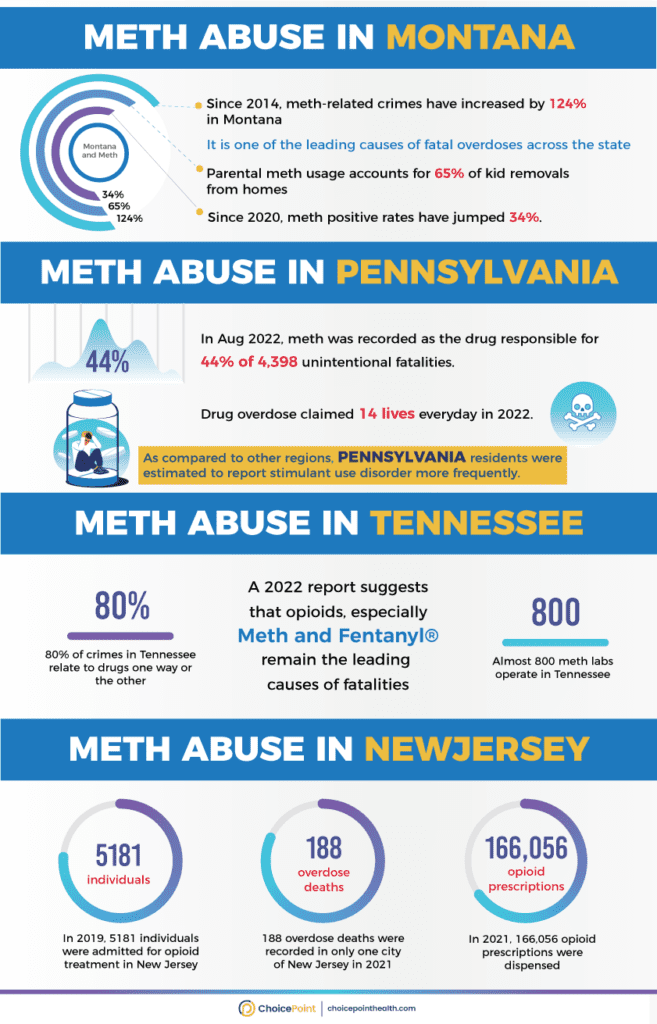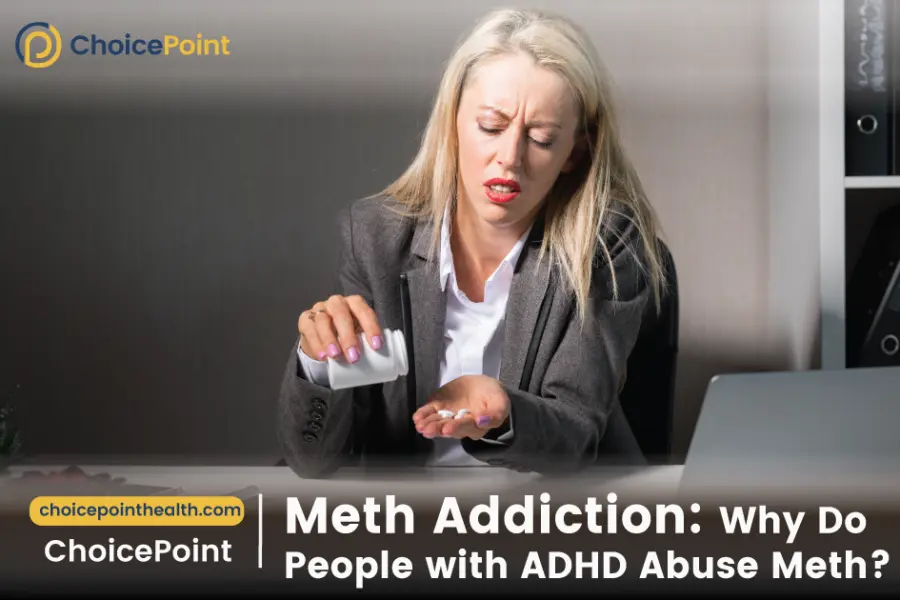According to an official report from 2022, meth has been recorded as one of the top causes of fatal drug overdoses, along with Fentanyl® and cocaine. It is estimated that 107,622 people became victims of meth in 2021, a 15% increase from 2020. Addiction is worsened when it is coupled with other mental illnesses. The correlation of ADHD with meth is a commonly discussed phenomenon and is quite common among young adults, especially students. The question remains: why do people with ADHD abuse meth? To explore suitable meth addiction treatment options, keep reading the article.
Through ChoicePoint’s dual-diagnosis treatment, you may recover from meth addiction if you also battle with ADHD.
Table of Contents
Correlation of ADHD and Meth Use
Attention-Deficit Hyperactivity Disorder (ADHD) is a mental health condition linked to impulsive behavior, concentration issues, and hyperactivity. A study suggests that individuals with ADHD are two to three times more prone to substance abuse.
Reasons Why People with ADHD Are Prone to Meth Addiction
- A person with ADHD has a lower level of dopamine than those without the condition.
- To make up for lower dopamine levels, they may fall into the curse of meth addiction.
- In the pursuit of experiencing calm, individuals with ADHD, especially young adults, may feel the urge to take meth constantly.
- As hyperactivity is exhausting, when meth provides calm and focuses, instead of following a productive routine, such people get hooked on meth.
Joe Zigmund, executive director at ChoicePoint, says, “Putting a stop to addiction at an early stage in individuals with ADHD is imperative. Because the battle with ADHD alone is exhausting enough, patients should not be subjected to the ruthless hands of addiction.”
Risk Factors: How Does Meth Affect Someone with ADHD?
Meth addiction in people with ADHD can be crippling mentally and physically.
a) Drug Tolerance
Individuals can take an unhealthy dose to seek pleasure, alertness, focus, and calm. This may result in drug tolerance. Drug tolerance means that once the body becomes habitual to ADHD drugs, it needs more to experience the same high. Unhealthy drug tolerance further results in the following:
- Turning to illicit meth intake
- Overdose
- Death due to overdose
Are You Developing Meth Addiction through ADHD Medication?
Medication is one of the ways through which ADHD is treated or managed. However, it becomes risky as the chance of getting hinged onto the ADHD medication is also high.
The following are the two stimulants that are prescribed to individuals battling with ADHD:
- Adderall®
- Ritalin®
- Vyvanse®
To reduce the risk of meth addiction in people with ADHD, it is fundamental to have strong supervision of the patient to minimize addiction risks.
b) Co-occurring Disorders
The risk of developing other mental illnesses, such as anxiety and depression, is higher among individuals with ADHD who are addicted to meth addiction. The additional disorders may result in more and more substance abuse. A study focused on meth addiction, and ADHD found that among those who were addicted to meth, 10.4% were ADHD-affected individuals. The same study shows that these two combined have astonishingly negative impacts on the quality of life.
What Is Prescription Meth?
Though you may only know the illicit version of methamphetamine, there is a legal and FDA-approved version as well, which is Desoxyn®. This is usually known as prescription meth.
- Rarely, a healthcare provider may prescribe this medication to individuals with ADHD as the medicine helps them remain focused.
- Meth is a potent brain stimulator.
- Prescription meth comes as a tablet and is taken orally.
- It is prescribed to increase attention and focus among individuals with ADHD.
Is There Meth in ADHD Meds?
No, meth is not present in all ADHD medicines. Adderall® is the brand name for a prescription drug that contains dextroamphetamine and amphetamine and is different from methamphetamine, commonly known as meth. Following are the similarities between Adderall® and Meth:
- Both are brain stimulants.
- Help focus and stay alert.
- Increase energy
- Both are addictive
The Biggest Differences between Crystal Meth and Adderall®
- Meth can release dopamine more strongly
- The strong euphoric feelings, confidence, and concentration make users rely highly on meth.
- Chemically, methamphetamine is more powerful than amphetamine.
REMEMBER
- The FDA warns about meth being more potent than amphetamine.
- Under the Controlled Substances Act, Meth is a Schedule II drug – with a high potential for abuse.
- Meth enters and stays in the brain.
- Meth poses more harmful side effects.
- Abuse can lead to life-threatening meth addiction.

Meth Abuse Statistics
Is Meth Prescribed for ADHD?
Meth is rarely prescribed to someone with ADHD. There are more efficacious medicines with fewer side effects that your doctor may prescribe for you.
Does Vyvanse Have Meth in It?
Vyvanse® is also a CNS stimulator like amphetamines and methamphetamine. It is the brand name for the stimulant lisdexamfetamine. Like Adderall®, Vyvanse® is also FDA-approved but poses the same addiction risks as other drugs.
If you or your loved one is addicted to any CNS stimulants, get professional help by contacting 844.445.2563 or filling out this online admission form.
Treatment Options for ADHD Patients with Meth Addiction
Susie Tushingham, a nurse at ChoicePoint says, “Though the personal commitment to recovery is necessary, it is accelerated by the constant support of medical professionals, which is why most people recover mainly with their assistance.”
There is no alternative to professional treatments when it comes to co-occurring disorders. Here are some effective treatment options for people who are addicted to meth and also battling with ADHD.
1) Dual Diagnosis Program
The dual Diagnosis, Addiction Treatment Program is specifically designed for individuals suffering from mental health issues and disorders while battling addiction. Because addiction may lead to other mental health issues and vice versa, it is important to treat the underlying condition so that an effective treatment for the individual can be proposed. A dual diagnosis treatment program at ChoicePoint will:
- Propose treatment for addiction as well as mental health.
- Virtual accessibility
- Cost-effectiveness
If you or your loved one is suffering from ADHD and Meth addiction. Dual diagnosis is the best treatment program for you.
2) Meth Detox Addiction Treatment Program
In the detox addiction treatment, the patient’s body is detoxified from all the toxins. At ChoicePoint, to assist you in achieving long-term recovery, our detox treatment integrates addiction therapies for long-term recovery, including:
- Cognitive-behavioral therapy
- Group therapy
- Individual therapy
- Family therapy
- Dialectical behavior therapy
3) Medication-Assisted Treatment (MAT) Program
For those who face meth addiction, our MAT program uses medication that the FDA deems safe for the patients, unlike the usual medicines that have many side effects. In our MAT program, our DEA-certified doctors employ the following medications:
- Suboxone®
- Subutex®
- Buprenorphine®
- Naltrexone®
Read our article, the top 5 medications prescribed at MAT Clinic , for proper understanding.
4) IOP/OP Addiction Treatment Program
At ChoicePoint, we offer Outpatient Treatment Program and an Intensive Outpatient Treatment Program. For those who struggle with severe meth addiction and ADHD issues, IOP may help you return to the sober life you dream of. With the help of our doctors and licensed nurses, you may lead healthier lives. By opting for IOP at ChoicePoint, you can enjoy the following benefits:
- Personalized treatments
- Doctors utilize targeted therapies
- Flexibility of timing
- You can return to your home and family
- It is comparatively affordable
- Support groups are available for patients
- Flexible scheduling
Meth Addiction: Bottomline
ADHD is a crippling illness that can put people more at risk of addiction. To treat meth addiction, our doctors ensure that the root cause is solved first, so we offer a dual diagnosis.
Medical Disclaimer:
ChoicePoint aims to improve the quality of life for people struggling with substance use disorder and mental health issues. Our team of licensed medical professionals research, edit and review the content before publishing. However, this information is not intended to be a substitute for professional medical advice, diagnosis, or treatment. For medical advice please consult your physicians or ChoicePoint's qualified staff.










Review Meth Addiction: Why Do People with ADHD Abuse Meth?.